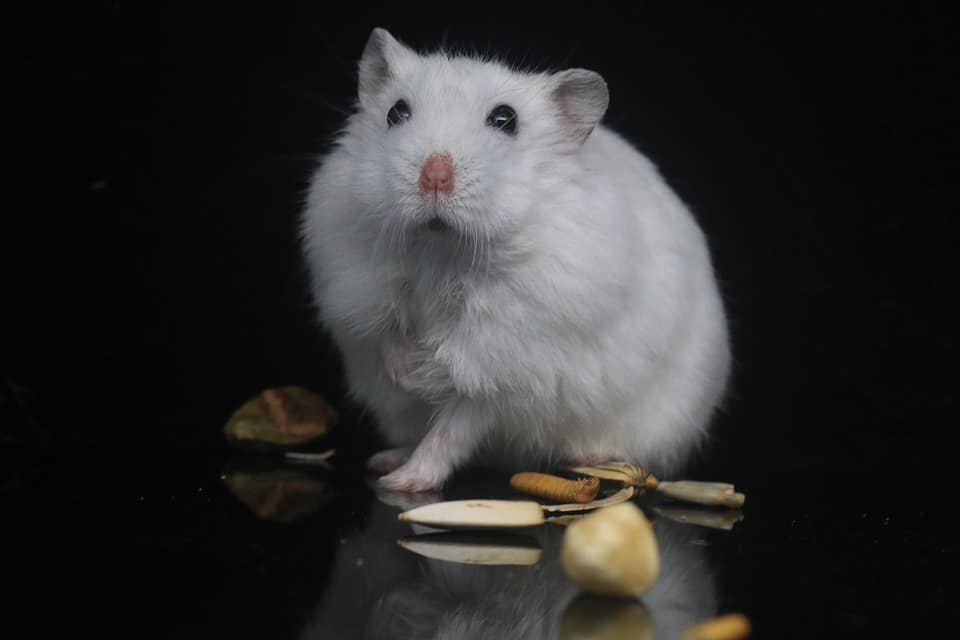If you own a hamster, their nighttime activities might have woken you up in the middle of the night. This occurs commonly because hamsters are crepuscular animals, meaning they’re asleep while most of the human world is awake, and wake up when humans are about to go to sleep. Because of their nighttime activities, many people wonder if these little rodents are capable of seeing the world around them in the dark.

If you’ve asked yourself: “Can hamsters see in the dark?” you’ve come to the right place. Today, we’re going to take a deep dive into the eyesight of our furry friends to discover how they perceive the world in darkness. Let’s dig in!
Can hamsters see in the dark?
Yes, hamsters can see in the dark, but not particularly well. Hamsters do not have very good eyesight in general, even when it’s light outside. In fact, baby hamsters are even born completely blind, they only gain vision later in life. Their vision is so poor that while hamsters can recognize their owners, they often do so through smell, rather than through sight!
Sight is simply not the primary sense that hamsters use to orientate themselves. Nevertheless, the eyes of hamsters are perfectly adapted to seeing in low-light environments.
However, this does not mean that they’re better at seeing in the dark than in the light, nor does it mean that they have night-vision. Any animal needs a little bit of ambient lighting (for instance moonlight, starlight, or an outside streetlamp) in order to see. It’s impossible to see in complete darkness because that’s simply how eyes work. However, it does mean that they only need a very small amount of light to see, much less than humans for instance.
Why can hamsters see in the dark?

In the wild, hamsters are prey animals. They have a lot to fear from snakes, birds, and foxes, which is why they hide in their burrows during the day. They prefer to come out when it’s dark because that’s when they feel safest. The darkness gives them cover to hide from predators when they’re out and about in their search for food.
In order to navigate the darkness, hamsters have naturally evolved to have eyes that are adapted to low-light situations which is why they’re good at seeing in the dark. In order to understand how this works, you first have to know a little bit about the eye.
You see, light enters the eye, that’s how any animal or human is able to see things. Without light, there is no sight. Sight basically works in 4 steps:
- Light enters the eye through the cornea
- The pupil adjusts in response to the light
- The lens focuses the light onto the retina
- The optic nerve transmits visual information to the brain
This 4-step-process is true for all animals. However, what allows hamsters and other nocturnal animals to see in the dark is that they’ve evolved to need less light to see. This is because they have many more rods in their eyes. These rods are extremely sensitive to light and thus allow hamsters to see more with less light available! There is a trade-off though because hamsters have so many rods, they have fewer cones, which means that hamsters are colorblind.
How hamsters get around at night 🌙
I’ve briefly touched on the fact that sight is not the primary sense that hamsters use to orientate themselves. Unlike humans, hamsters do not rely on sight that much. Instead, they rely heavily on their keen sense of smell and hearing.
Their sense of smell and hearing is much stronger than their sense of sight, which makes sense. After all, it doesn’t matter whether it’s dark or light outside, your nose and ears will work the same – ideal for an animal that comes out at night like the hamster!
Hamsters use their strong sense of smell and hearing to communicate, mate, and find food. All very important aspects of their lives!
Should I give my hamster a night light? 💡
No, you do not need to give your hamster a light at night. While the intention of people who ask this is good – they want to help their hamster get around their cage easier at night – it’s asked from a human-centric perspective.
As humans, we rely incredibly much on our sight. Our ability to see is far stronger than our ability to hear or smell. Without sight, it’s almost impossible for us to get around.
Because this is how we experience the world, we project that onto our pets, disregarding the fact that they experience the world completely differently! Unlike us, they rely much more on sight and
As touched upon, hamsters rely much more on scent and hearing than they do on sight. On top of that, they’re perfectly capable of seeing in low-light conditions. Furthermore, hamsters actually like being in the dark at night because it helps them keep a natural sleep schedule.
So should I cover my hamster’s cage during the day then?
No, you should not cover your hamster’s cage during the day. While they enjoy being in the dark at night, covering their cage during the day disturbs their day/night cycle.
Can all hamster breeds see in the dark?
As you might know, there are several different hamster breeds that people keep as pets. However, all of them are nocturnal creatures. Because of this, they’ve all evolved to be able to see in the dark. Syrian hamsters and all the dwarf hamster breeds are perfectly capable of seeing in the dark.
Conclusion
So, to sum it all up, hamsters can indeed see in the dark. They can do this because their nocturnal nature has allowed their eyes to evolve to be more receptive to light. Because of this, they’re capable of seeing in very low-light conditions.
However, even though they’re capable of seeing in low-light conditions it’s not the sense they primarily rely on when getting around in the dark. Instead, they rely much more on scent and hearing to navigate the dark world around them.
- How Long Do American Eskimo Dogs Live? Important Factors and Care Tips - September 29, 2023
- Do American Bulldogs Need Grooming? Essential Tips and Care Guidelines - September 29, 2023
- Do Bengal Cats Enjoy Playing? Essential Tips for Keeping Them Active - September 29, 2023